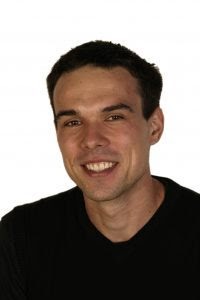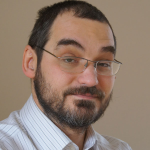Meet the Trainers – Tobias Rausch and Alexey Larionov
On the occasion of World Cancer Day (4 February), we meet two of the trainers of the virtual EMBL Course: Cancer Genomics (17 – 21 May 2021) – Tobias Rausch and Alexey Larionov.

Tobias Rausch (TR) received his PhD in “Computational Biology and Scientific Computing” at the International Max Planck Research School in 2009. He then started to work at the European Molecular Biology Laboratory (EMBL) as a bioinformatician. His primary research interests are population and cancer genomics, structural variant discovery and omics computational methods development. (https://github.com/tobiasrausch).

Initially educated as a clinical oncologist in Russia, Alexey Larionov (AL) switched to experimental oncology upon completion of his PhD. Initially he worked as a postdoctoral researcher in Edinburgh University studying transcriptomics of breast cancer, with a focus on markers and mechanisms of endocrine response and resistance. Working with data-rich methods (qPCR, micro-arrays, NGS) he became interested in data analysis and switched to bioinformatics. Since completing his MSc in Applied Bioinformatics, Alexey has worked as a bioinformatician at Cambridge University, focusing on NGS data analysis and heritable predisposition to cancer. See http://larionov.co.uk for more details.
What is your research focus?
TR: Computational genomics.
AL: Heritable predisposition to cancer
Why did you choose to become a scientist?
TR: When I started at EMBL I saw myself as a software engineer who loves to design, develop and implement algorithms to solve data analysis problems. With the advent of high-throughput sequencing, this engineering background gave me a competitive edge as a data scientist, and that’s how it happened!
AL: It was interesting…
Where do you see this field heading in the future?
TR: Nowadays cancer genomics is a data-driven team science, but it is a long way from obtaining data to obtaining insight. In the age of analytics we all have to wrap our heads around multi-domain data with spatio-temporal resolution, ideally in real-time.
AL: I assume that the question is about translational cancer research in general. I expect that in the near future the field needs better integration of different types of biological data and better collection of relevant clinical data.
How has training influenced your career?
TR: I think training is essential to get you started. Training is like a kind person who takes your hand and guides you through unknown territory. It goes along with mentorship and I was lucky enough to have good training and good mentorship already as a student.
AL: Since my initial clinical and bioinformatics degrees, cancer research has changed so much that I would not be able to even understand current papers if I hadn’t taken regular in-depth training in different aspects of computing and bioinformatics.
How has cancer research changed over the years?
TR: I hope I am still too young to answer that :-). I leave that question for Bert Vogelstein or Robert A. Weinberg.
AL: Cancer research has become much more complex and powerful because of the development of new methods; specifically significant progress in bioinformatics, sequencing and human genomics.
Which methods and new technologies will be addressed in the course?
TR: We try to give an overview of how high-throughput sequencing can be applied in cancer genomics. We cover a range of technologies (short-read and long-read sequencing), data types (RNA-Seq, DNA-Seq and ATAC-Seq) and data modalities (bulk and single-cell sequencing), and last but not least – we take a deep dive into cancer genomics data analysis.
AL: In my sections of the course, I will discuss established methods for the analysis of bulk RNA sequencing, focusing on differential gene expression. Then I will touch on the new methods being developed for the analysis of long-read RNA sequencing.
What learning outcomes should participants expect to take home after the course?
TR: To come back to my previous answer: I hope after the course, cancer genomics won’t be an unknown territory anymore for the participants. I hope we pave the way and then it’s up to the students to make something out of it.
AL: In my section of the course, participants will learn:
1) Bioinformatics algorithms and tools for QC, alignment, and gene expression measurement in bulk short-read RNA-sequencing data
2) Current approaches to analysis of long-read RNA-seq data, comparing the Oxford Nanopore and PacBio sequencing technologies.
Interested in this course? Apply by 26 February.
For more upcoming events on cancer research take a look at our event listing.